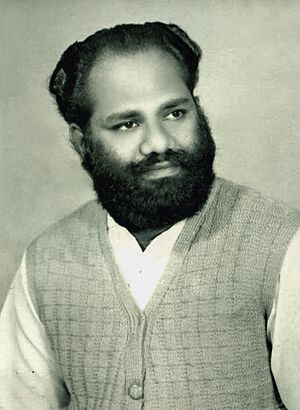T. Sivasithamparam facts for kids
Quick facts for kids
T. Sivasithamparam
|
|
|---|---|
|
தா. சிவசிதம்பரம்
|
|
 |
|
| Member of the Ceylonese Parliament for Vavuniya |
|
| In office 1960–1970 |
|
| Preceded by | C. Suntharalingam |
| Succeeded by | X. M. Sellathambu |
| In office 1977–1983 |
|
| Preceded by | X. M. Sellathambu |
| Personal details | |
| Born | 26 March 1926 |
| Died | 9 November 1992 (aged 66) Canada |
| Political party | All Ceylon Tamil Congress |
| Other political affiliations |
Tamil United Liberation Front |
| Alma mater | Trincomalee Hindu College |
| Ethnicity | Sri Lankan Tamil |
Thamotharampillai Sivasithamparam (Tamil: தாமோதரம்பிள்ளை சிவசிதம்பரம்; born March 26, 1926 – died November 9, 1992) was an important politician from Sri Lanka. He was a Sri Lankan Tamil and served as a Member of Parliament. This means he was elected by the people to represent them and help make laws for the country.
Contents
Early Life and Family Background
Thamotharampillai Sivasithamparam was born on March 26, 1926. His father, Thamotharampillai, was a village leader in Mullaitivu, a town in northern Sri Lanka (which was then called Ceylon). Sivasithamparam went to school at Trincomalee Hindu College.
He married Nagambi, and they had five children. Their three sons were named Sugumaran, Srikanthan, and Sivakumar. They also had two daughters, Vanetha and Kanchana.
Political Career and Public Service
Before becoming a Member of Parliament, Sivasithamparam worked as a Village Cultivation Officer (VCO). This role likely involved helping farmers and managing agricultural activities in villages.
Entering Parliament
In March 1960, Sivasithamparam decided to run for election as an independent candidate. He wanted to represent the Vavuniya area in Parliament. He won this election and became a Member of Parliament.
He was re-elected in another election held in July 1960. Later, he joined a political group called the All Ceylon Tamil Congress (ACTC). He became the leader of the youth section of this party.
Re-election and Party Changes
Sivasithamparam ran for election again in 1965 as a candidate for the ACTC. He was re-elected, continuing his work in Parliament. However, in the 1970 election, he lost his seat to X. M. Sellathambu, who was from a different party called the Illankai Tamil Arasu Kachchi (ITAK).
On May 14, 1972, several political parties decided to work together. The ACTC, ITAK, Ceylon Workers' Congress, Eelath Thamilar Otrumai Munnani, and All Ceylon Tamil Conference formed a new group. This group was first called the Tamil United Front, but it later changed its name to the Tamil United Liberation Front (TULF).
Final Term in Parliament
Sivasithamparam became a candidate for the TULF in Vavuniya for the 1977 parliamentary election. He was elected again, returning to Parliament.
In the middle of 1983, Sivasithamparam and other TULF Members of Parliament stopped attending Parliament. They did this for several reasons. One reason was pressure from Tamil groups who did not want them to stay in Parliament beyond their usual six-year term.
Another reason was a new rule called the Sixth Amendment to the Constitution of Sri Lanka. This rule required them to promise that they would not support a separate state for Tamils. Also, there were serious events called the Black July riots, where many Tamils were harmed.
After being absent for three months, Sivasithamparam lost his seat in Parliament on October 5, 1983.
Life After Politics
On September 30, 1983, the Sri Lankan Army attacked Sivasithamparam's farm in Madukulam. Sadly, the farm manager, Nadarajah, was killed. Fearing for his own safety, Sivasithamparam left Sri Lanka and went to India. He later moved to Canada, where he passed away on November 9, 1992.
 | James B. Knighten |
 | Azellia White |
 | Willa Brown |

